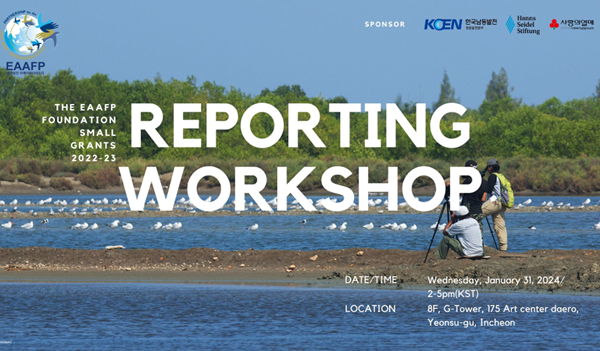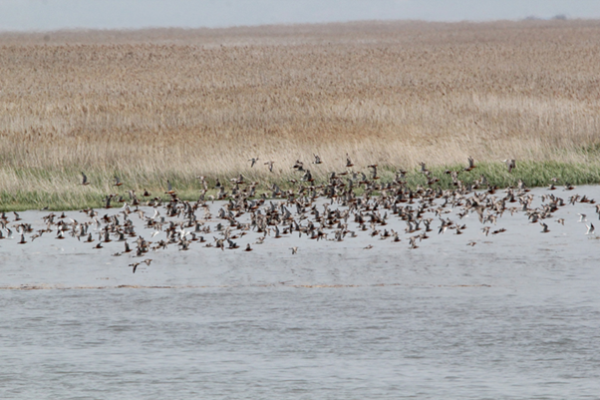On October 16th, 2019, the “2019 Wetland Education Center Symposium” was held in Haikou, Hainan Province, China. The symposium was supervised by the Wetland Management Department of the National Forestry and Grassland Administration (NFGA), and co-hosted by Paulson Institute, Lao Niu Foundation and Mangrove Foundation (MCF). The symposium also drew up support from Haikou Forestry Bureau, Haikou Wetland Protection and Management center, and the Vanke Foundation.
36 representatives from relevant governmental departments of wetland protection and management, international organizations and civil society organizations attended the symposium. The participants exchanged their experiences and strategies on the establishment of wetland education centers. The “Guidelines for the Establishment of Wetland Education Centers (in Draft)”, which was drafted by the Wetland Education Center of China Coastal Wetland Conservation Network was discussed in detail.
Ms. Gao Jingfang, Director of the General Office, Wetland Department of NFGA, Dr. Shi Jianbin, consultant of Paulson Institute, and Dr. Yan Baohua, Secretary General of MCF, offered appointment certifications to the members of advisory panel. Experts who are well experienced in establishing and managing wetland education vowed to provide guidance and support for the project.
Gao made a speech in the symposium. She said that “Natural education is a vital starting point for ecological civilization and is an urgent need for economic and social development. With the development of economy and society, the improvement of awareness of ecological civilization, natural education, which is characterized by the spirit of ‘walking into nature’ and ‘returning to nature’, has become a new demand of the public”. She expected that the project would enhance the awareness-building and education functions of wetland nature reserves. She hoped that the project could highlight its uniqueness and make it well known by the public. In addition, Gao also appealed that those coastal wetland and nature reserves, which are in good conditions should be set up as models in the national efforts to build a harmony between human beings and natural wetlands.
Ms. Yang Xiaoqing, project officer of MCF, introduced the achievements that the Wetland Education Center project had yielded. From 2018 to 2019, in line with MCF visions and missions, the center organized different symposiums and trainings. Drawing on the data collected from field work, the experts worked out a detailed plan for the building of three “model sites”, which would function as demonstration for the network members.
Experience Sharing
Bena Smith, British expert from Wild Birds and Wetlands Trust (WWT), shared his experience in building and operating the London Wetland Education Center. In his talk, “How to successfully design and operate a wetland center”, Bena stressed that though different from each other, all centers the share same concept that human beings and nature should be closely connected. Wetland centers should provide both formal and informal wetland knowledge for the public. It is a basic principle, all wetland centers should actively link people with nature and provide both formal and informal learning places for the public. It is very important for young people to acquire the intimacy in their connection to nature and wetlands. At last, Bena noted that the founder of WWT has devoted all his life to realize the belief, which appeals people to be truly involved in activities so as to arouse their enthusiasts in wetlands and nature.
Chen Shihong, Chief Executive of Wild Bird Society of Taipei, shared his long-term experience in the construction of wetland education center in Taiwan and Guandu Nature Park in Taipei City. Chen’s talk was “Establishment, Management and Speculation of Wetland Education Center”. “I believe that ‘walking faster is not as good as walking longer’. I often share this belief with my colleagues. If you want to walk longer, it is not realistic to build a nature park the same as Guandu Nature Park in Taipei City and London Wetland Park right away or you will find it very tiring. So keep your steps, a new model may emerge in five years”, Chen Shihong said.
Ye Simin, who began to work in nature education in 2004, is now in charge of the coordination and operation planning of nature education of WWF, hoping to use education to promote nature conservation. In her talk, “Evaluation of the Effectiveness of Environmental Education Activities”, Ye Simin, Deputy Director of Education of WWF Hong Kong, emphasized that the evaluation should be built into the natural education activities and not an optional external link. The evaluation in natural education activities faces many challenges, such as the determination of evaluation criteria, how to carry out the evaluation within the limited time, and the impact of changes in natural conditions on the evaluation. At the same time, she also shared her experience in evaluation practice.
Round-table Conference
Symposium on the Revision of Guidelines for the Establishment of Wetland Education Centers
In the round table symposium, participants fully discussed the draft of “Guidelines for the Establishment of Wetland Education Center”, with focus on four key elements, including sustainable development, educational activities, teaching venues, and personnel. Based on their own practices gained from building other nature education centers and wetland parks, participants put forward suggestions for improvement. With the help of constructive suggestions from experts, the project team would revise the draft, which expects to provide clear, practical and feasible guidance for our partners to build and run wetland education centers.
___________________________________________________________________________________________________________
What is a Wetland Education Center?
Wetland Education Center is a place where people can interact with wildlife and organize regular activities through which people can communicate, learn, participate and raise awareness based on wetland protection.
The center provides public with pleasant environment and an approachable place to know wetlands. The establishment of Wetland Education Center is a practical means to promote education, raise awareness and understand the significance of wetland protection.
Why Do We Need a Wetland Education Center?
In September 2018, the Wetland Education Center project was launched by the Wetland Management Department of SFGA, Lao Niu Foundation, Paulson Institute and MCF, in Beijing. The education center project is succedent work after establishment of China Coastal Wetland Conservation Network (CCWCN). In three years, the education center project expects to build 3-5 demonstrative wetland education centers in China, in accordance with international standards. Goals of the project are as follows: a) to build the establishment and operation mode of China wetland education center; b) to promote the specialized and systematic education and publicity of coastal wetland; c) to lay a foundation for public support of, and participation in, coastal wetland conservation.
Following the first and second wetland education center seminars held in January and September 2018, The 2019 Wetland Education Center Seminar was held in Haikou city on October 16, 2019. Haikou City was officially selected as the first international wetland city in the world in October 2018, and it bears more symbolic significance to hold the conference in such an international wetland city.
An Introduction to the Project
In order to curb quick shrink in size and fast deterioration in functions in China’s wetlands, as well as reversing sharp decline of coastal wild fish resources, in 2015, the Wetland Management Department of SFGA (formerly the Wetland Protection and Management Center of the State Forestry Administration), together with Paulson Institute, jointly launched the “China Coastal Wetland Conservation Network” project. Based on the works that done by CCWCN, in 2018, the Wetland Management Department of SFGA, Paulson Institute, Lao Niu Foundation and MCF jointly launched the Wetland Education Center project. The project expects to professionalize coastal wetland education in China through education centers. The project also helps to draw public support and improve social engagement for effective protection of coastal wetlands.

Gao Jingfang, Director of the General Office, Wetland Department, SFGA, makes a speech at the symposium. 林草局湿地司综合处处长高静芳致辞 © MCF

Yang Xiaoqing, MCF project officer, introduces the project that the Wetland Education Center is working on. 红树林基金会(MCF)项目官员杨小清介绍“中国沿海湿地保护网络湿地教育中心“项目 © MCF

Bena Smith, from WWT International Wetland Management, is well-experienced in wetland and waterfowl management and conservation. Bena Smith,WWT国际湿地管理的专家,有很丰富的湿地管理、水鸟管理和保护经验 © MCF

Chen Shihong, Chief Executive of Wild Bird Society of Taipei makes a speech. His talk focuses on nature conservation, nature education and bird conservation, and how to promote nature conservation through nature education. 陈仕泓,台北市野鸟学会总干事,专注于自然保护、自然教育以及鸟类保护保育,如何利用自然教育促进自然保护的工作 © MCF

Ye Simin, who began to work in nature education in 2004, is now in charge of the coordination and operation planning of nature education of WWF, hoping to use education to promote nature conservation. 叶思敏,2004年开始从事自然教育工作,现在负责世界自然基金会自然教育的协调跟运营筹划工作,希望利用教育促进自然保护 © MCF
Chinese version:
湿地教育中心如何建立—第三届湿地教育中心研讨会
2019年10月16日, “第三届湿地教育中心研讨会” 在海南海口召开。这次研讨会是由国家林业和草原局湿地管理司指导,保尔森基金会、老牛基金会、红树林基金会(MCF)共同主办,海口市林业局、海口市湿地保护管理中心协办,万科公益基金会支持。
36名来自湿地保护与管理相关部门代表、国际组织及社会组织代表参加了会议,就优秀湿地教育中心创建经验、评估策略开展交流并详细讨论了由中国沿海湿地保护网络湿地教育中心项目组起草的《湿地教育中心创建指引(讨论稿)》。
会上,国家林草局湿地司综合处处长高静芳、保尔森基金会顾问石建斌、红树林基金会(MCF)秘书长闫保华为中国沿海湿地保护网络湿地教育中心项目专家顾问组颁发了聘书。这些在湿地教育中心创建有着丰富理论和实践经验的专家顾问,将持续对该项目的开展提供专业指导和支持。
国家林草局湿地司综合处处长高静芳为研讨会致辞,她说“自然教育是生态文明的重要抓手,是经济社会发展的迫切需要,随着我国经济社会发展和生态文明意识的提高,以走进自然、回归自然为主要特点的自然教育已经成为公众的一个新要求。希望我们的项目通过开展多种形式提升各类湿地类型自然保护地的宣教功能,打造亮点、打造品牌,以条件好的沿海湿地自然保护地为基础,支持他们打造和创建一批样板点,进一步形成人与自然湿地和谐发展的局面。”
红树林基金会(MCF)项目官员杨小清介绍了“中国沿海湿地保护网络湿地教育中心“项目成果,项目组在2018-2019年,主要围绕项目愿景和目标开展工作,主要包括研讨会、专题培训,以及在调研基础上为首批网络成员中的三个样板点进行的规划等专项工作。
主题分享
英国野鸟与湿地信托基金会(简称WWT)Bena Smith 结合伦敦湿地教育中心的创建、运行等经验分享主题“如何成功设计和运营湿地中心“,Bena 认为“虽然各个湿地中心都不一样,但是都有一个共同特质就是所有的湿地中心都将人与自然紧密的联系在一起,并为人们提供正规的、非正规的学习机会。对于湿地中心都是一个基本原则:所有湿地中心都应该将人与自然紧密联系一起,并为人们提供正规、非正规的学习的地方。让青少年在湿地获得和自然连接的亲密感非常重要,WWT创办人一生都致力于此,一直强调让人们真正的参与自然的活动,引发对于湿地和自然的兴趣。”
台北市野鸟会总干事陈仕泓以“湿地教育中心的创建、管理与思考”为主题,分享了台湾在建设湿地教育中心和台北关渡自然公园长久运营的经验等内容。“对我们自然教育中心的伙伴,我常常跟他们分享一件事情:走的快不如走得久,要让你这个组织走得久,不能说现在就要建的跟关渡(台北市关渡自然公园)、伦敦湿地公园一样,说实在的,不是很现实,而且你会发现很累。所以要保持你的步骤,五年后就可能产生一个新的案例跟模式。”
世界自然基金会香港分会教育副总监叶思敏的“环境教育活动成效评估”强调评估工作应内置于自然教育活动之中,需不是可有可无的外置环节。自然教育活动中的评估工作面临诸多的挑战,例如评估标准的确定、如何在有限的活动时间内开展评估、自然条件变化对评估的影响等。同时,她还分享在评估实践工作中的经验。
圆桌会议
《湿地教育中心创建指引》专项研讨
本届研讨会通过圆桌会议的形式,以《湿地教育中心创建指引(讨论稿)》所涉及湿地教育中心创建的四个要素可持续发展、教育活动、教学场地、人员配置为主题分组进行了讨论。参会人员结合自己所在保护区、湿地公园的自然教育中心创建实践,为《指引(讨论稿)》提出了各个层面的建议。项目组后期将根据建议修改《湿地教育中心创建指引(讨论稿)》,以期为沿海湿地伙伴创建和运营湿地教育中心提供直观、易落地、付诸实践的参考和指引。
___________________________________________________________________________________________________________
湿地教育中心是什么?
湿地教育中心是指一个人们能够和野生动植物互动,并定期举办以湿地保护为前提的交流、教育、公众参与和意识提升活动的场所。
湿地教育中心可以为人们亲近湿地提供美好的环境,同时也是学习湿地知识的重要场域。建立湿地教育中心是推广湿地教育、提升公众生态观念、宣传湿地保护意义的有效方法。
为什么要设立湿地教育中心
2018年9月,国家林业和草原局湿地管理司、老牛基金会、保尔森基金会以及红树林基金会(MCF)在北京正式启动了“中国沿海湿地保护网络湿地教育中心”项目,计划在未来三年时间里,在中国按照国际标准建立和发展3-5个湿地教育中心样板点,探索中国湿地教育中心创建和运营模式,推动沿海湿地的教育、宣传工作向专业化、系统化方向发展并为沿海湿地的有效保护奠定公众支持和社会化参与基础。
继2018年1月和9月先后召开了第一届和第二届湿地教育中心研讨会后,第三届湿地教育中心研讨会在2019年10月16日于海口市举办。海口市2018年10月正式入选全球首批国际湿地城市,会议在这样的国际湿地城市举办更有标志性意义。
项目介绍
为尽快遏制中国滨海湿地面积大幅减少、滨海湿地生态服务功能退化、近海海域野生鱼类资源急剧下降的趋势,2015年,国家林草局湿地管理司(原国家林业局湿地保护管理中心)和保尔森基金会联合发起了“中国沿海湿地保护网络”。
在中国沿海湿地保护网络的基础上,2018年,国家林草局湿地管理司、保尔森基金会、老牛基金会、红树林基金会(简称MCF)又共同启动了 “湿地教育中心项目”,旨在通过发起建设中国湿地教育中心行动,整体推动中国沿海湿地宣教工作的专业化发展,为沿海湿地的有效保护奠定公众支持和社会化参与的基础。
The article was prepared by Mangrove Foundation (MCF) 红树林基金会







